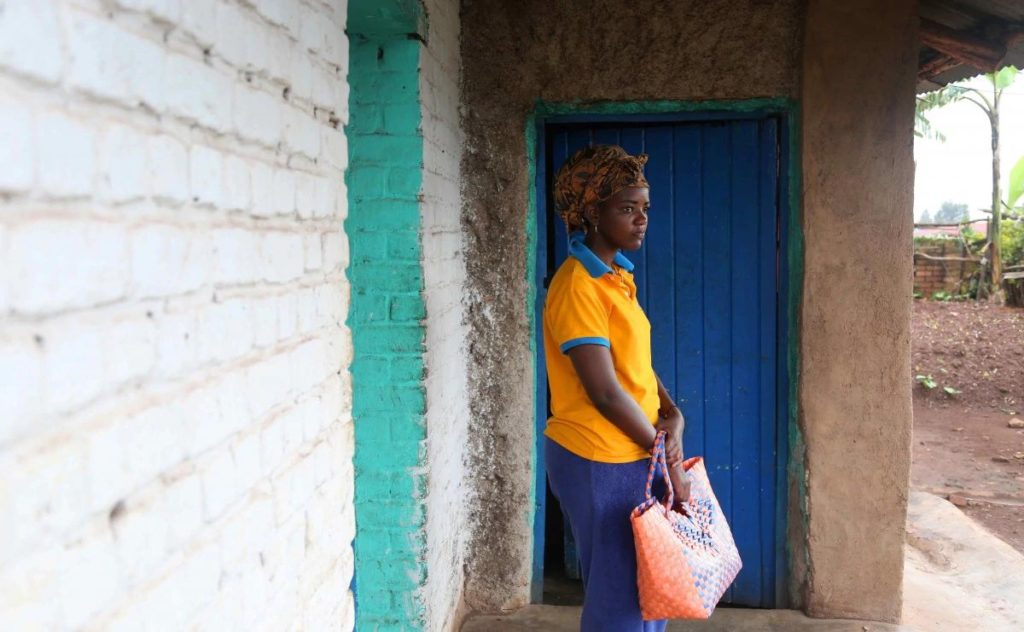
Sunlight streams through Angel’s window, catching her metallic hoop earrings. She sits at a wooden table next to her mother, Jacqueline. They split a loaf of bread for breakfast and wash it down with tea. Jacqueline sprinkles brown sugar into their cups.
“Murakoze,” Angel tells her in Kinyarwanda. Thank you.
They live together under a tin roof in a rural village, where a Catholic church pays their monthly rent, the equivalent of $5. The cracked walls are painted turquoise. A mosquito net dangles above their full-size bed. A rooster outside crows.
Angel is 22 now, with a quick grin and braids down her back. She was born HIV positive, so she takes free pills from the government to stay healthy. She has just finished high school and is waiting for the test score that will shape her future.
High marks would net her a scholarship. The results will appear online in a couple of weeks. Angel and her mother will pray before heading to the Internet cafe.
Tourism is her dream career. Her backup plan is selling tomatoes.
“We don’t have money,” she explains.
Angel learned early how she came to be. Jacqueline would tell her: You’re not my real daughter.
“Whenever she would go somewhere, and if I asked her to let me come with her, she always refused and locked me inside,” Angel says softly through an interpreter. “She would also not permit me to play with other kids.”
Jacqueline tears up when she thinks of this.
Before the genocide, she was someone else’s mom. They were in fourth and sixth grade, her girls. They complained about bullies hounding them for being Tutsis, a minority ethnic group. Jacqueline was on her way to Kigali, the nation’s capital, to secure spots for them in a new school when the violence started. Rwandan government leaders had commanded the majority population, the Hutus, to exterminate the Tutsis. Neighbors slaughtered neighbors. Colleagues murdered colleagues. Hutu fighters found Jacqueline hiding in a Catholic school and took turns raping her. She remembers praying to die.
But three months passed, and a Tutsi rebel army overthrew the government, and there she was, following a U.N. soldier out of the rubble. Her husband and children were dead. She now had HIV and a baby on the way.
Jacqueline once poured soap and hair dye into Angel’s bottle and decided to drink the toxic mix, too. She wanted everything to go black. But instead they vomited, and Jacqueline reluctantly decided to keep going.
She would hug Angel, then beat her. Affection and rage, affection and rage. This pattern held until they started therapy in 2007, run by an organization called Foundation Rwanda. (The Washington Post agreed to a request from the foundation and the families interviewed for this article to withhold their last names, so they can avoid discrimination and harassment.)
The charity organized weekly support groups, and the other moms inspired Jacqueline to become a Christian. She began to feel that Angel had come from God.
Foundation Rwanda paid Angel’s school tuition through graduation. Which has brought her to this point, this limbo.
She mostly hangs around her house, except to buy food or refill her medicine or go to church. She recently broke up with her boyfriend of five years — he wanted to get married, and she didn’t want to tell him about her HIV.
Beyond her plank fence, the hills burst with banana trees. Adobe homes dot the horizon — tiny from here, like Monopoly pieces. Men play checkers outside a shuttered dive bar. Someone’s cow moos.
Angel is comfortable in her universe, but she is curious about what else is out there. She waits for the test score.
Source: Turning Pain into Hope by Danielle Paquette. First published in the Washington Post.
